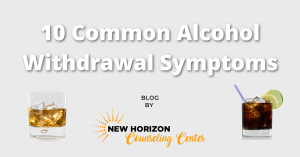
Sometimes people might find themselves unable to stop drinking, and as a result, they may experience withdrawal symptoms when they try to stop. Long-term alcohol use can cause serious damage to the body through liver disease and brain shrinkage. There are some withdrawal symptoms that may occur even after one has been sober for a long time, and these usually only last a few days.
Seeking support including counseling and therapy for alcohol addiction or alcoholism is strongly recommended when someone is experiencing alcohol withdrawal symptoms. New Horizon Counseling Center(NHCC), a non-profit behavioral health organization licensed by the NYS Office of Alcoholism and Substance Abuse, offers alcohol and substance abuse treatment programs. With their recovery program, clients can achieve long-term sobriety by addressing their substance abuse and alcohol addiction issues.
Here are 10 of the most common withdrawal symptoms that people may experience as they stop drinking alcohol and how New Horizon Counseling Center can help:
1. Dizziness
Dizziness is one of the more common withdrawal symptoms in alcohol addiction. It is during the initial stages of withdrawal that people may go into a state where they experience feelings of disorientation and vertigo. This can occur because the body is not able to regulate blood pressure and heart rate well enough to function normally.
New Horizon can help people identify and treat the underlying conditions that may be causing the dizziness, such as high blood pressure. It is important to consult with a doctor or psychiatrist to determine what is causing the dizziness.
2. Sweating
When someone stops drinking, their body may respond by having increased levels of stress hormones like cortisol. This causes the body to go into a state of hyperactivity as well as increased sensitivity. This can cause sweating, which also brings with it other symptoms such as nausea and vomiting.
A trained therapist can help people find ways to cope with the increased levels of stress that they experience during withdrawal. New Horizon is able to provide such therapy, as well as detoxification services if necessary.
3. Nausea and Vomiting
Nausea and vomiting are two common withdrawal symptoms that usually take place in the initial stage of alcohol detoxification. These symptoms can be quite severe and may last for a short period of time.
However, patients who experience these symptoms need to have their blood sugar levels checked. This is because those with hypoglycemia might find themselves experiencing similar symptoms. They may also need to have their blood pressure levels checked as well. New Horizon can help patients control the vomiting if they are suffering from hypoglycemia or dehydration by counseling them on the important body fluids to take.
4. Anxiety
As people go through withdrawal, they may experience high levels of anxiety. This is usually the result of the increased sensitivity that the body displays when it has stopped drinking. The anxiety can be so severe that people feel as though they are on edge, and they may also have difficulties sleeping as a result.
Anxiety can affect someone’s mood by causing them to feel irritable or frustrated. A therapist can help identify what causes this anxiety and then work with patients to come up with ways to manage their feelings of anxiety.
5. Aches and Pains
In addition to the symptoms of anxiety, patients may experience pains and aches in their muscles when they stop drinking. These symptoms may range from feeling tired and having a lack of energy to experiencing tightness in the muscles or restless legs. There are many other conditions that can cause these aches in the muscles, including vitamin deficiency, low blood sugar levels, metabolic disorders, and others.
New Horizon will help patients determine whether the pain and aches that they experience are alcohol withdrawal symptoms or whether there may be another condition causing this. The team of professionals at the center is able to provide treatment for alcohol addiction as well as other conditions.
6. Trouble Sleeping
A person’s natural chemical balance may be disturbed by alcohol use, which causes them to experience trouble sleeping and restlessness when they stop drinking. This can also result in headaches, nausea, and vomiting when they try to sleep.
A therapist trained in alcohol addiction and other forms of substance abuse treatment can help patients overcome these symptoms by providing them with the tools and knowledge needed to sleep better. New Horizon Counseling Center can work with individuals in developing a personalized treatment plan.
7. Low Energy Levels
When people stop drinking, their body undergoes a state of physical and mental exhaustion, which causes them to have trouble sleeping, as well as fatigue, sore muscles, and headaches. These symptoms make it difficult for them to function normally and as a result, they may feel tired or have trouble concentrating.
A trained therapist can help patients develop coping skills or home remedies to help them deal with these symptoms. They will also work with individuals to identify what could be contributing to the physical and mental exhaustion that they experience after stopping drinking. The clients’ body chemistry will also be taken into account when figuring out what causes these sensations.
8. Abdominal Pain and Nausea
When someone stops drinking, it causes their body to go into a state of physical and emotional stress. It can cause them to feel very uncomfortable and even hurt. This can result in heart problems and stomach aches that may be accompanied by nausea or vomiting.
A therapist trained in drug abuse treatment can help people recognize the symptoms of withdrawal as they are occurring so they can act fast to relieve themselves of the discomfort. New Horizon will provide a safe and comfortable place where this can be accomplished.
9. Drug Cravings
It can be difficult to get rid of alcohol cravings once they have started. However, a trained therapist can help patients understand the cycle of addiction, as well as treat these cravings. A drug counselor can work with people to address these feelings by helping them recognize when cravings are occurring and how they may be treating the alcohol cravings that they experience.
10. Brain Fog
Research has shown that alcohol use can hurt cognitive functioning. When a person stops drinking, he or she will experience a state of brain fog, which happens when the chemicals in his or her brain that are used to regulate emotions are disrupted. The brain fog makes it difficult for someone to think clearly, concentrate, and remember things.
A drug counselor can work with the patient to support their self-esteem during this challenging time. They can help them understand how their cognitive functioning will return to normal once they are detoxified.
Conclusion
If you are recovering from addiction and are working on recovering from substance use, it is essential to have a professional, compassionate support system in place. New Horizon Counseling Center has rehab campuses that can work with you during your recovery journey and provide you with a safe, confidential treatment environment where you can get back on track.


